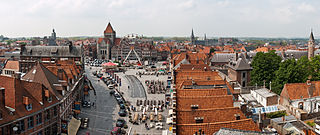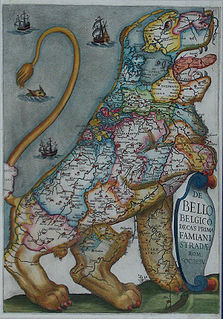
West Flemish is a collection of dialects spoken in western Belgium and the neighbouring areas of France and Netherlands.

Flanders is the Dutch-speaking northern portion of Belgium and one of the communities, regions and language areas of Belgium. However, there are several overlapping definitions, including ones related to culture, language, politics, and history, and sometimes involving neighbouring countries. The demonym associated with Flanders is Fleming, while the corresponding adjective is Flemish. The official capital of Flanders is the City of Brussels, although the Brussels-Capital Region has an independent regional government. The government of Flanders only oversees the community aspects of Flanders life in Brussels, such as Flemish culture and education.

Erpe-Mere is a municipality located in the Belgian province of East Flanders in the Denderstreek. The municipality comprises the towns of Aaigem, Bambrugge, Burst, Erondegem, Erpe, Mere, Ottergem and Vlekkem. There is also a hamlet in Bambrugge: Egem. Erpe-Mere is crossed by 2 brooks, the Molenbeek and the Molenbeek-Ter Erpenbeek. In 2021 Erpe-Mere had a total population of 20,286. The total area is 34.03 km². The current mayor of Erpe-Mere is Hugo De Waele, from the CD&V party.

Merelbeke is a municipality located in the Flemish province of East Flanders, in Belgium. The municipality comprises the villages of Bottelare, Lemberge, Melsen, Merelbeke proper, Munte and Schelderode. In 2021, Merelbeke had a total population of 24,779. The total area is 36.65 km².

Tournai or Tournay is a city and municipality of Wallonia located in the province of Hainaut, Belgium. It lies 85 km (53 mi) southwest of Brussels on the river Scheldt. Tournai is part of Eurometropolis Lille–Kortrijk–Tournai, which had 2,155,161 residents in 2008.

Belgian French is the variety of French spoken mainly among the French Community of Belgium, alongside related Oïl languages of the region such as Walloon, Picard, Champenois, and Lorrain (Gaumais). The French language spoken in Belgium differs very little from that of France or Switzerland. It is characterized by the use of some terms that are considered archaic in France, as well as loanwords from languages such as Walloon, Picard, and Dutch.
Middle Dutch is a collective name for a number of closely related West Germanic dialects whose ancestor was Old Dutch. It was spoken and written between 1150 and 1500. Until the advent of Modern Dutch after 1500 or c. 1550, there was no overarching standard language, but all dialects were mutually intelligible. During that period, a rich Medieval Dutch literature developed, which had not yet existed during Old Dutch. The various literary works of the time are often very readable for speakers of Modern Dutch since Dutch is a rather conservative language.

The Flemish Movement is an umbrella term which encompasses various political groups in the Belgian region of Flanders and, less commonly, in French Flanders. Ideologically, it encompasses groups which have sought to promote Flemish culture and Dutch language as well as those who have sought greater political autonomy for Flanders within Belgium. It also encompasses nationalists who have sought the secession of Flanders from Belgium, either through outright independence or unification with the Netherlands.

Limburgish, also called Limburgan, Limburgian, or Limburgic, is a West Germanic language spoken in the Dutch and Belgian provinces of Limburg and in the neighbouring regions of Germany.

The Dutch are a Germanic ethnic group and nation native to the Netherlands. They share a common ancestry and culture and speak the Dutch language. Dutch people and their descendants are found in migrant communities worldwide, notably in Aruba, Suriname, Guyana, Curaçao, Argentina, Brazil, Canada, Australia, South Africa, New Zealand and the United States. The Low Countries were situated around the border of France and the Holy Roman Empire, forming a part of their respective peripheries and the various territories of which they consisted had become virtually autonomous by the 13th century. Under the Habsburgs, the Netherlands were organised into a single administrative unit, and in the 16th and 17th centuries the Northern Netherlands gained independence from Spain as the Dutch Republic. The high degree of urbanization characteristic of Dutch society was attained at a relatively early date. During the Republic the first series of large-scale Dutch migrations outside of Europe took place.
East Flemish is a collective term for the two easternmost subdivisions of the so-called Flemish dialects, native to the southwest of the Dutch language area, which also include West Flemish. Their position between West Flemish and Brabantian has caused East Flemish dialects to be grouped with the latter as well. They are spoken mainly in the province of East Flanders and a narrow strip in the southeast of West Flanders in Belgium and eastern Zeelandic Flanders in the Netherlands. Even though the dialects of the Dender area are often discussed together with the East Flemish dialects because of their location, the latter are actually South Brabantian.

Zeelandic is a group of Friso-Franconian language varieties spoken in the southwestern parts of the Netherlands. It is currently considered a Low Franconian dialect of Dutch, but there have been movements to promote the status of Zeelandic from a dialect of Dutch to a separate regional language, which have been denied by the Dutch Ministry of Internal Affairs. More specifically, it is spoken in the southernmost part of South Holland (Goeree-Overflakkee) and large parts of the province of Zeeland, with the notable exception of eastern Zeelandic Flanders.
Dutch is a West Germanic language, that originated from the Old Frankish dialects.

The Low Countries comprise the coastal Rhine–Meuse–Scheldt delta region in Western Europe, whose definition usually includes the modern countries of Luxembourg, Belgium and the Netherlands. Both Belgium and the Netherlands derived their names from earlier names for the region, due to nether meaning "low" and Belgica being the Latinized name for all the Low Countries, a nomenclature that went obsolete after Belgium's secession in 1830.

The Kingdom of Belgium has three official languages: Dutch (Flemish), French, and German.
Dutch dialects are primarily the dialects that are both cognate with the Dutch language and are spoken in the same language area as the Dutch standard language. Dutch dialects are remarkably diverse and are found in the Netherlands and northern Belgium.

Dutch is a West Germanic language spoken by about 25 million people as a first language and 5 million people as a second language, constituting most of the population of the Netherlands and about 60% of the population of Belgium. It is the third most widely spoken Germanic language, after its close relatives English and German.

Aaigem is a village belonging to the municipality of Erpe-Mere. It is located in the province of East Flanders, Belgium. The village has some 2000 inhabitants. Aaigem was an independent municipality with an area of 7.32 square kilometers till 1976.

The Flemish or Flemings are a Germanic ethnic group native to Flanders, Belgium, who speak Flemish Dutch. Flemish people make up the majority of the Belgian population, at about 60%.

Flemish (Vlaams) is a Low Franconian dialect cluster of the Dutch language. It is sometimes referred to as Flemish Dutch, Belgian Dutch, or Southern Dutch. Flemish is native to Flanders, a historical region in northern Belgium; it is spoken by Flemings, the dominant ethnic group of the region. Outside of Flanders, it is also spoken to some extent in French Flanders and the Dutch Zeelandic Flanders.



















